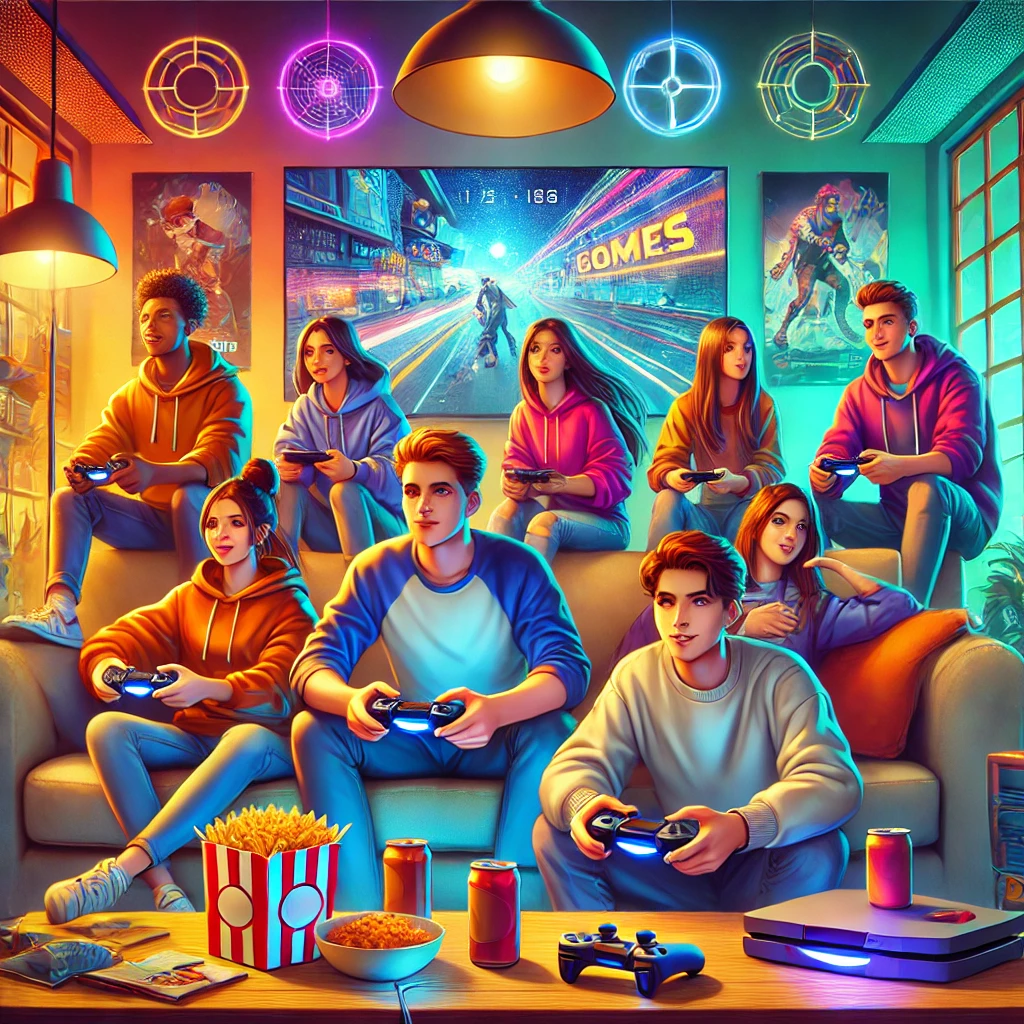Table of Contents Show
As the gaming industry continues to evolve at an astonishing pace, 2025 promises to be another groundbreaking year for gamers and developers alike. The rapid advancements in technology, changing consumer preferences, and global trends are shaping a vibrant and transformative gaming landscape. Here’s what to watch for in the coming year.
1. Rise of AI-Driven Gameplay
Artificial intelligence is taking center stage in game development. From creating smarter NPCs (non-player characters) to procedural storytelling, AI is enabling more dynamic and personalized gaming experiences. Expect games that adapt to your choices in unprecedented ways, offering unique playthroughs for each gamer. For example, AI-driven narratives can change based on your moral decisions or even your skill level, ensuring games remain challenging but enjoyable.
2. Cloud Gaming Gains Momentum
With faster internet speeds and improved infrastructure, cloud gaming is becoming more viable for the masses. Services like Xbox Cloud Gaming, NVIDIA GeForce NOW, and PlayStation Plus are expanding their reach, allowing players to stream high-quality games on virtually any device. In 2025, we’ll likely see more developers optimizing games specifically for the cloud, reducing the need for expensive hardware.
3. Virtual Reality (VR) and Augmented Reality (AR) Enter Mainstream
While VR and AR have been around for years, 2025 might finally be the year they break into the mainstream. Affordable headsets, improved motion tracking, and immersive experiences are drawing in more casual gamers. Titles like “Half-Life: Alyx” set the stage, and future releases are expected to build on this foundation. AR, on the other hand, continues to evolve with games like “Pokémon GO” paving the way for more complex and social experiences.
4. Metaverse Integration
The concept of the metaverse – a shared virtual space where users can interact – is becoming increasingly prevalent. Gaming platforms are at the forefront of this revolution. Games like “Fortnite” and “Roblox” are already experimenting with metaverse-like features, hosting concerts and virtual events. In 2025, expect deeper integration with metaverse ecosystems, allowing players to seamlessly transition between gaming, socializing, and even working within these platforms.
5. Blockchain and NFTs in Gaming
Despite controversies, blockchain technology and NFTs (non-fungible tokens) are carving a niche in gaming. These technologies offer gamers true ownership of in-game assets, which can be traded or sold on open markets. Developers are exploring blockchain as a way to create unique in-game items, player-driven economies, and decentralized gaming worlds. However, the focus will likely shift to sustainability and reducing the environmental impact of blockchain gaming.
6. Cross-Platform Play Becomes the Norm
Gamers are no longer confined to specific platforms. Cross-platform play, which allows players on different devices to join the same game, is becoming a standard feature. Games like “Call of Duty” and “Minecraft” have proven its popularity. In 2025, expect even more developers to embrace this trend, breaking down barriers and fostering more inclusive gaming communities.
7. Mobile Gaming’s Unstoppable Growth
Mobile gaming is outpacing traditional console and PC markets in terms of revenue and player base. Innovations in mobile hardware, such as foldable screens and dedicated gaming phones, are enhancing the experience. Moreover, mobile esports and AAA-quality titles for smartphones are gaining traction. Watch for new titles designed to leverage the unique capabilities of mobile platforms.
8. Esports Expands Beyond Gaming
Esports is evolving into a global entertainment phenomenon, rivaling traditional sports in viewership and revenue. 2025 will likely see esports integrating more closely with mainstream media, featuring crossover events, celebrity endorsements, and even partnerships with traditional sports leagues. The rise of collegiate and grassroots esports initiatives will further fuel its growth.
9. Sustainability Takes Center Stage
As climate change becomes a pressing global issue, the gaming industry is stepping up its efforts to reduce its environmental footprint. Developers are adopting greener practices, from energy-efficient servers to recyclable packaging for physical games. Gamers, too, are becoming more conscious, demanding sustainable choices from the industry.
10. Inclusivity and Representation
The push for diversity and representation in games is stronger than ever. Developers are recognizing the importance of creating games that reflect a wide range of cultures, identities, and perspectives. Expect to see more diverse characters, stories, and development teams in 2025, ensuring that gaming is truly for everyone.
11. Hyper-Realistic Graphics and Physics
With advancements in graphics technology, games are becoming indistinguishable from reality. Ray tracing, real-time reflections, and ultra-realistic character models are now standard features in AAA games. Coupled with more sophisticated physics engines, these improvements promise to deliver breathtaking visuals and lifelike interactions in 2025.
12. Gaming as a Social Platform
Gaming is increasingly being used as a social tool, allowing people to connect and interact beyond traditional gameplay. Multiplayer games now double as virtual hangout spaces. In 2025, expect more features like integrated voice chat, customizable avatars, and social hubs where players can gather, share experiences, and build communities.
13. Subscription-Based Models Continue to Flourish
The success of subscription services like Xbox Game Pass and PlayStation Plus is reshaping the way gamers access content. These services offer a vast library of games for a monthly fee, making gaming more affordable and accessible. In 2025, we’re likely to see more publishers launching their own subscription services, as well as innovations in pricing models.
14. Health and Wellness in Gaming
The relationship between gaming and health is becoming a focal point. Developers are incorporating features that promote physical and mental well-being, such as fitness-based games and mindfulness apps. Gaming peripherals like VR fitness equipment and ergonomic controllers will also gain popularity, ensuring that gaming remains a healthy pastime.
15. AI-Powered Game Development
AI is not only enhancing gameplay but also streamlining game development. Tools powered by machine learning are helping developers create realistic environments, animations, and even scripts with minimal effort. This allows smaller studios to compete with industry giants, fostering innovation and diversity in the types of games being produced.
Final Thoughts
The gaming industry’s trajectory in 2025 is nothing short of thrilling. From AI advancements and VR breakthroughs to the rise of the metaverse, these trends promise to redefine what’s possible in gaming. Whether you’re a casual player, a competitive gamer, or someone working in the industry, staying informed about these trends will help you navigate and thrive in this dynamic space.
For more insights into gaming’s future, check out this TechCrunch article on gaming innovation and this Wired feature on VR advancements.








